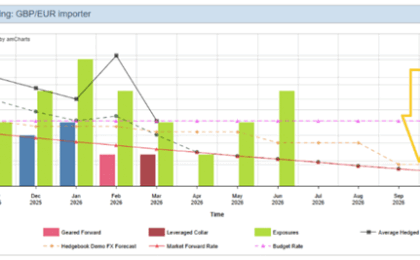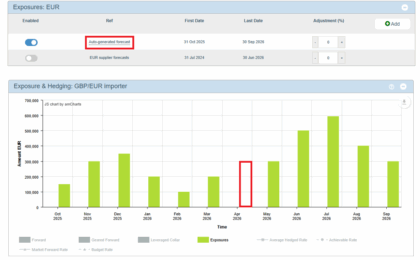Spreadsheets should not be used for FX management
The main competitor to Hedgebook’s treasury management system (“TMS”) is excel spreadsheets. They are cheap (can’t get much cheaper than free!), flexible and easy to use. So why do companies choose to replace their spreadsheets with a TMS? Despite the positives of spreadsheets they also represent a significant risk to businesses when relied on as the sole mechanism to record and report treasury derivatives such as FX forwards, FX options and interest rate swaps.
Importers and exporters more exposed
Importers and exporters are naturally heavy users of foreign exchange derivatives and often have many outstanding transactions at any given point of time. There are also pre-deliveries and extensions to manage, too. Understandably, spreadsheets are the “go to” repository for these transactions, however, the error prone nature of spreadsheets make them a risky choice. Some of the most common errors we have witnessed are as follows:
- Fat fingers i.e. mis-keyed data
- Incorrect formulas
- Hardcoded numbers
- Spreadsheets set to update manually rather than automatically
- Broken, not updated, incorrect links
- Corrupted
- Low skill levels of users
There will always be an element of human error when inputting deals whether into a spreadsheet or a system, however, a system will naturally have some checks and balances to minimise such errors. A TMS negates all the other aforementioned common errors.
How comfortable is your auditor with spreadsheet risk?
Is your auditor comfortable that key business risks are being managed with spreadsheets? Your auditor will certainly thank you for moving away from spreadsheets and de-risking the business. Financial reporting compliance will be more efficiently achieved with a system. For one thing a TMS will provide independent valuations, unlike spreadsheets, which will make the often tedious audit process slightly less so.
Often companies rely on spreadsheets that have been built by an individual who is no longer part of the company. There is a large element of blind faith that the spreadsheets are still functioning as intended. When was the last time the spreadsheets were audited? I can guarantee there will be an error lurking in there somewhere. Some are less pernicious than others so hopefully yours is of the immaterial variety. If you are reliant on spreadsheets I suggest they are audited regularly and not by the person who uses it. Ask someone else to do the sense check as often the person who uses it is blind to even the most obvious errors.
Not everyone is an excel wiz. Even if the spreadsheet was constructed by a highly skilled spreadsheeter, it is the expertise level of the day-to-day user that is important. Replacing spreadsheets with a system helps to ensure the business is not left exposed to lower levels of excel competency.
First published in Bobs Guide August 2015
To see what your world might look like without a spreadsheet take a look at the overview video on Corporate Treasury page.





